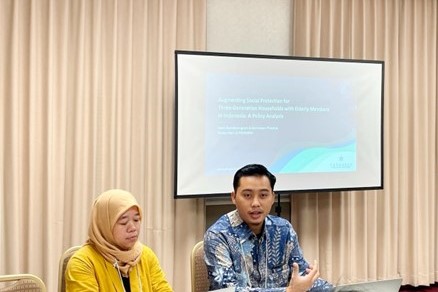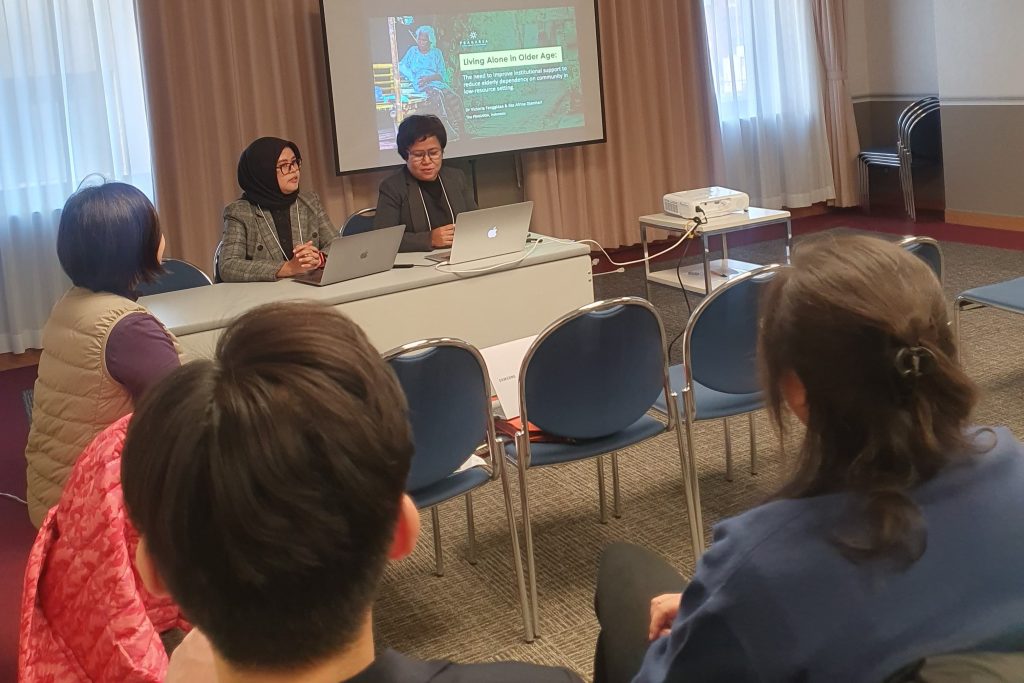2022 will be a historic event and an important moment for Indonesia. The reason is that in October, Indonesia will host the G20 (Group of 20) meeting as well as hold the G20 presidency for a full year, starting from December 1, 2021 until the G20 Summit (KTT) in November 2022. This forum will produce policies- world economic policies that have a direct impact on the sustainability of development in the country. And as the G20 presidency, Indonesia has the privilege to determine the issues to be discussed at the G20 meeting.
This year's presidential theme is “recover together recover stronger” with three main priority issues that require collective action globally, namely the global health architecture, sustainable energy transition, and digital and economic transformation.
The discussion was attended by resource persons Ah maftuchan as C20 sherpa, Panji Tirta Nirwana Member of Working Group Taxation & Sustainable Finance, Fiona Armintasari Coordinator of Working Group Taxation & Sustainable Finance, and Dalyono Policy Analyst Associate Expert, Fiscal Policy Agency.
Fiona explained that WG Taxation & Sustainable Finance encourages G20 member countries to take a sustainable economic recovery path, including through the application of the principles of fair redistribution and sustainable finance. "We want to encourage the G20 and its member countries to adopt a path of sustainable economic recovery as well as equitable taxation. From a sustainable finance perspective, we believe that the G20 can encourage actors in the financial sector to pay more attention to the impact of their financing on the economic aspect. social, environmental, and governance. Then we also encourage the G20 to come up with green taxonomy initiatives."
In terms of taxation issues, Paji stated that in terms of taxation, the practice of profit shifting, illicit financial flows, international tax regulations that are not yet inclusive, and the development of the digital economy have made international taxation issues the basis for the importance of tax reform. “Specifically on tax issues, namely how the G20 can encourage increased tax revenues and control illicit financial flows. Taxation is an important instrument, but there are still problems such as illicit financial flow. We are also pushing for tax reform, resolving illicit financial flows, bilateral policy development processes, digital taxes, and more gender-inclusive taxes."
Ah Maftuchan explained that currently 7 working groups in C20 are preparing priority issues and expected outcomes. In the issue of taxation itself, there are several strong proposals, including how the G20 takes the lead again to reform the global tax system, build consensus on the application of digital taxes, complete the BEPS mechanism, and reconsider the formation of a tax agency under the United Nations that is more binding.
“The first is to take a leadership position on digital tax reform. One that we criticize quite strongly is the 15% tax bracket for corporate taxes. In our opinion, this figure is quite low, as a result, we will also reduce the tax rate by up to 20%. In the end, what happens is that there is a potential for "sales" of tax rate battles between countries to occur. So, in the G20, we hope that Indonesia will dare to propose an increase in the tax rate that has been agreed globally to a minimum rate of 20%. Second, we hope that Indonesia will dare to lead the interests of developing countries in digital taxes. Third, the completion of the BEPS (Best erosion profit shifting) mechanism as an effort to anticipate IFF, transfer miss pricing, and aggressive tax planning by multinational companies. Fourth, it is necessary to reconsider the establishment of a tax agency under the United Nations which is more binding.”
It is important to do digital taxes immediately, because they will be very useful for post-recovery development and the impact of the Covid-19 pandemic.
Ah Maftuchan also emphasized that funding for energy transition, climate justice, and pandemics should also be a consideration in regulating business practices in financial services.
Dalyono explained how to finance such a huge climate change, including mobilizing domestic financing sources. "There are agendas related to collecting financing sources, if in the domestic sector there is domestic resource mobilization to encourage income from the fiscal side."
In terms of sustainable finance, there are three steps that need to be taken and currently being discussed in the sustainable financing working group, among others, encouraging the emergence of credible financing instruments including financial institutions, agencies whose products are affordable from financing, and the government issuing policies. which can encourage sustainable financing investment.
On the other hand, Indonesia is currently developing an energy transition mechanism by implementing two mechanisms, namely reducing the use of natural resources that have the potential to increase greenhouse gas emissions, such as coal, and developing new energy sources. The government is currently proposing the formation of a financing group, consisting of multilateral development banks, the private sector, developing partners, and philanthropists to carry out financing related to climate change.



